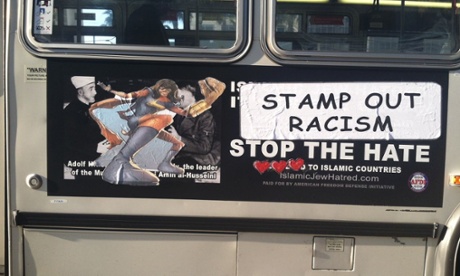
At the start of the year, the extremist anti-Islamic group the Freedom Defense Initiative purchased 50 controversial ads to be displayed on San Francisco city buses. The ads – perceived as out of step with the city’s largely liberal metropolitan community – called for an end to aid to Islamic countries and depicted a Muslim leader consorting with Hitler, essentially equating Islam with Nazism. In response to these Islamophobic messages, street artists affiliated with the Bay Area Art Queers Unleashing Power acted quickly to cover the ads with vibrant images of Pakistani-American superhero Ms Marvel along with comic-style blurbs trumpeting messages of equality: “Calling All Bigotry Busters,” “Stamp Out Racism” and “Free Speech Isn’t a License to Spread Hate”.
The bus art has been called “graffiti”, “defacement”, and “supremacist criminality” by some, but for an overwhelming majority the culture-jamming demonstration holds a powerful significance. For the first time ever, Muslim Americans have a visible, mainstream superhero they can call to arms. As a major Marvel character, Kamala Khan (Ms Marvel’s alter ego) stands alongside Wolverine, Captain America, Iron Man and the X-Men. Her image is synonymous with her message: freedom of speech belongs to everyone. Ms Marvel comic co-creator and writer G Willow Wilson, a Muslim American herself, likened the bus art to a freedom of speech “call and response”, ultimately summing up her sentiments with a tweet that ended with “Spread love.”
This isn’t the first time comic characters have influenced and informed readers about social-justice issues. Superman has a 75-year history of reflecting and enacting essential virtues such as patriotism, honesty and freedom. A force for good. But we’ve come a long way since the days of homogeneous heroes and damsels in distress. In fact, the largest comic publishers, DC Comics and Marvel, have begun to move towards more inclusive and diverse superhero narratives in both written form and on screen. From releasing the first female Thor title to introducing a mixed-race Spider-Man, Marvel has shifted its spotlight to tell stories more readers can relate to. Agent Carter, a one-shot mini-series spin-off of Agents of SHIELD, with Hayley Atwell reprising her Peggy Carter character from the Captain America films, has had decent reviews. With a Supergirl television series just announced by CBS and a Wonder Woman film set for release in 2017, DC Comics is breaking similar ground.
Kamala Khan is Marvel’s first Muslim-American character to headline her own comic book. A teenager living in the suburbs of New Jersey with immigrant parents, Kamala knew she wasn’t a typical superhero. In fact, when she became aware of her shape-shifting skills and super-strength, she questioned why her superhero self didn’t look like the original Ms Marvel, Carol Danvers: tall, blond-haired and fair-skinned. In a TEDxTeen talk, Myths, Misfits and Masks, Marvel Entertainment editor and Ms Marvel co-creator Sana Amanat said creating Kamala was a simple solution that happened to carry a remarkable impact: “I created a character I could identify with.”
Creators, writers and artists from within the comics industry are recognising the gaps in representation when it comes to visibility, agency, and power in fictional universes. These creators redirect our attention to questions we may have not asked in the past. “What makes a superhero? And who decides?” Kelly Sue DeConnick, writer of the innovative sci-fi prison-adventure comic Bitch Planet, is one such creator. During a panel at last year’s New York Comic Con, she stated, “I will make people uncomfortable so my daughter won’t have to.”
Push Comics Forward is perhaps the most innovative step towards transforming what we see in comics. Rather than market one particular character, title, or even publisher, it is a campaign evolving from the inside of the comics community out. As founder and CEO of BOOM! Studios Ross Richie announced at the campaign’s launch, the landscape of comics is changing. Citing BOOM! titles such as Lumberjanes and Memetic, he said: “No one thought an all-female cast of characters with an all-female creative team had a shot … and who would have guessed that a [comic] starring a hearing-impaired, gay college student and a blind, African-American general would garner rave reviews?”
The medium of comics is indeed changing, and so is its impact. With invisibility now being the least desired superpower, the ultimate mission is to make comics meaningful for everyone.
Andrea Letamendi tweets at @ArkhamAsylumDoc

